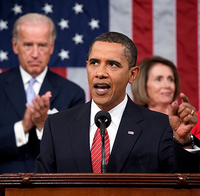Some foreign policy analysts believe that President Barack Obama's legislative victory on health care reform this week will have a positive impact on his ability to make progress in the foreign policy realm as well.
Clearly, Obama's credibility in the eyes of foreign governments would have been severely -- perhaps even irreparably -- damaged had he failed to pass the flagship legislation of his domestic agenda, despite overwhelming Democratic majorities in both houses of Congress. But the White House is not out of the woods just yet. For the president to build on the momentum he gained from the health care victory, as well as from the announcement that the logjam over the START follow-on treaty with Russia has finally been broken, he will have to demonstrate that he can convince members of Congress to sign on to his long-term vision for restoring American global leadership.
Getting the START treaty quickly ratified will be a key benchmark. Assuming that no sudden final negotiating snags materialize, he and Russian President Dmitry Medvedev will sign the arms-control agreement next month in Prague. The Russians dropped their demand for binding language in the treaty on missile defense, a concession to political realities in America: The likelihood of the Senate ratifying any document that put constraints on the U.S. ability to deploy missile defense systems against Iran was next to nil.

